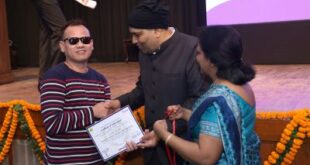Mohandas Karamchand Gandhi was born on 2nd October, 1869, in Porbandar. He was fascinated by the character of Raja Harishchandra at an early age. This child later came to be known as ‘Bapu’ by an entire nation. This article is an effort to analyze Mohandas’s personality from a psychological perspective, which can help us understand how he became ‘Bapu’.
The Big Five Personality Traits Model measures five dimensions of a person’s personality. This measure has stood the test of multiple decades of research. It is a questionnaire on a 5-point Likert scale (John, Donahue, & Kentle, 1991) that measures personality on five dimensions, i.e., extraversion, agreeableness, openness to experience, conscientiousness, and neuroticism. We are trying to understand Gandhi’s personality using his actions, statements, and writings from his autobiography, “My Experiments with Truth” (Gandhi, 1929), as our main source. We take them as evidence of his personality traits and reveal why he was a successful politician and a revered leader.
Mahatma Gandhi’s Personality
Gandhi was not an extrovert. He was reserved and shy (his shyness had worked like a shield for him). After first thinking of it as a challenge to overcome, eventually he was proud of it rather than running away from it. He was generally quiet and not talkative. “It was impossible for me to speak impromptu. I hesitated whenever I had to face strange audiences and avoided making a speech whenever I could. Even today, I do not think I could or would even be inclined to keep a meeting of friends engaged in idle talk.” On the other hand, he was full of energy, had the ability to generate enthusiasm, and was assertive. His assertiveness is evident in the fact that he did not change his decision to go abroad even when he was declared an outcast.
Gandhi was open to experience. He was curious, imaginative, artistic, excitable, and unconventional. Evidence of this is that he sought new experiences and intellectual pursuits. He made all efforts to pursue studies in London. He was flexible and adventurous, evident in the fact that even though he had promised his mother and wife that he would not eat meat, he did so in order to become stronger; “it was not for the taste.” He was imaginative and innovative, and this is evident from the fact that he came up with a number of crucial ideas that helped India place a credible challenge to the British Empire in India. These were Satyagraha (struggle for truth), which was used to identify the struggle for independence; Swadeshi (self-sufficiency) to quit foreign goods and stop the drain of Indian money; Harijan (children of god) to identify Dalits and their fight against caste-based oppression; and Padyatra as a way to rally people and protest.
Gandhi was conscientious. He cared about the people, especially those who were oppressed by people in power. He engaged in debate and discussion with local gurus over caste-based oppression of Dalits and cleaned his own toilet. He was thorough with the scriptures and carefully invoked textual proof to support his arguments. He was efficient, organized, careful, thorough, and disciplined. He was not impulsive and would carefully prepare his speech.
Gandhi was agreeable. He was forgiving, warm, stubborn, modest, and sympathetic. He believed in forgiveness and even forgave multiple assassination attempts on his life. This is also evident in his statement, “The weak can never forgive. Forgiveness is the attribute of the strong.” He was stubborn as well. “A vow is a vow. It cannot be broken.” Yet, he was modest and sympathetic. This combination helped him break through caste barriers, engage in dialogue, and question and refute the logic of long-held beliefs. Consequently, he could call out the oppression inflicted by those in power without insulting and alienating them. This helped him become a successful negotiator from a weaker standpoint as a subject of British rule as well as negotiating among people of different castes, classes, and political viewpoints. Gandhi was not tense, irritable, or moody in his actions or in his conversations with others.
How did Mahatma Gandhi become ‘Bapu’?
Research suggests that rather than looking at five traits, we tend to simplify the personalities of leaders and politicians by focusing only on a couple of them. Political success depends on energy, innovation, honesty, and trustworthiness (Caprara, Barbaranelli, Consiglio, Picconi & Zimbardo, 2002; 2003). As evident from his life and work as a political leader, he was enthusiastic and energetic, always eager to do padayatra and go on a fast. He was definitely innovative in his ideas. Be it the idea of harijans or non-violence, it was unique and provided people with a completely new perspective.
At the same time, they were organic ideas (not completely alien and can be found in Indian culture much earlier than Gandhi implemented them) that resonated with the elites and the masses alike. Additionally, his personal life of brahmacharya, abstinence, and struggle for the downtrodden of society led him to be a revered person. He often sat while talking or giving speeches. This created a perception of a strong mind that one can learn from, emulate, and follow. A learned gentle guru who protected the downtrodden and was ready to give up his life for the country made him the beloved ‘Bapu’ of the nation.
Authored by:
Kalash Shah, Undergraduate Student, FLAME University
Dr. Shruti Goyal, Faculty of Psychology, FLAME University
Dr. Abhishek Sahai, Faculty of Psychology, FLAME University
 Newspatrolling.com News cum Content Syndication Portal Online
Newspatrolling.com News cum Content Syndication Portal Online





